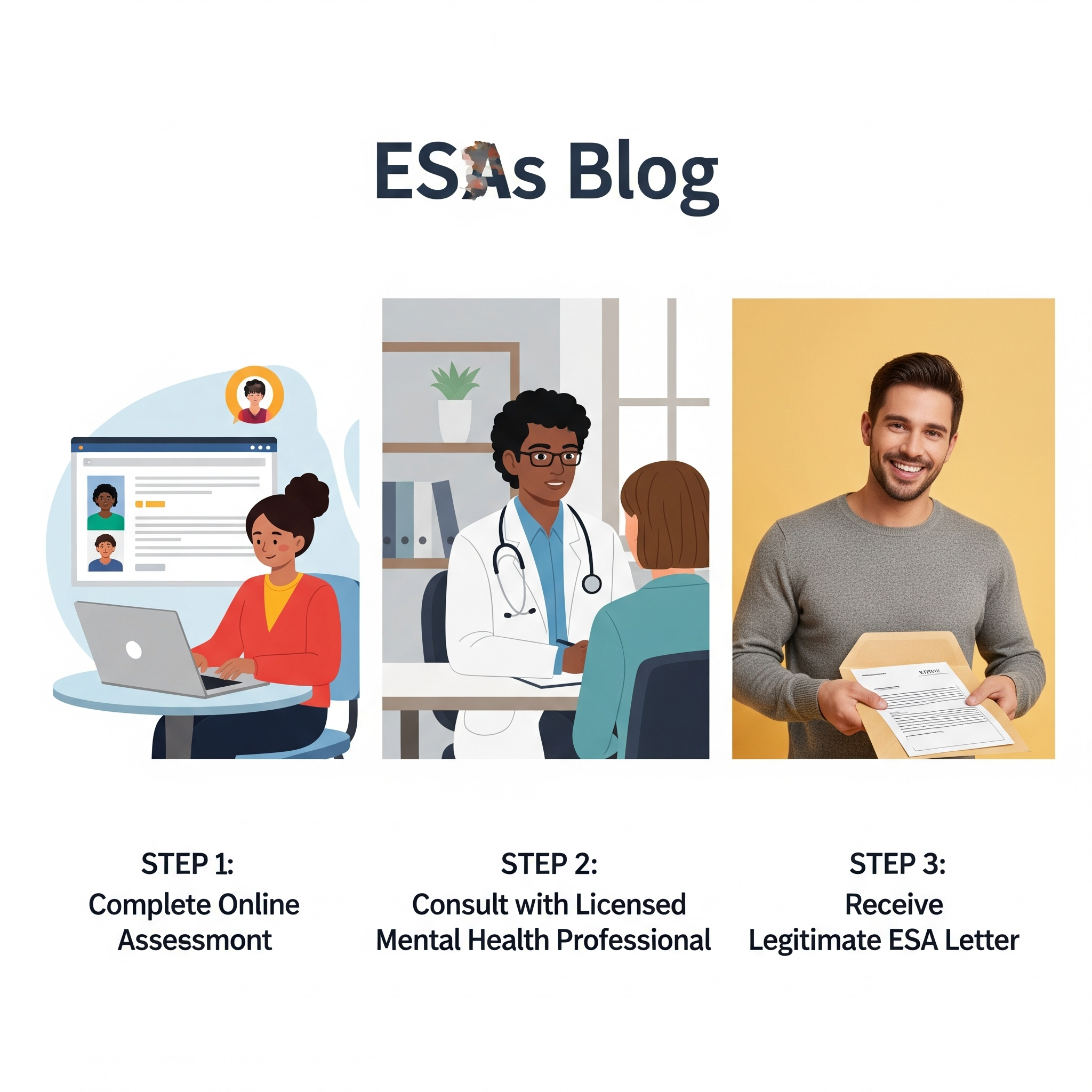For individuals relying on an Emotional Support Animal (ESA) to manage mental or emotional disabilities, their ESA letter is the cornerstone of their housing rights. It’s the document that legally allows their cherished companion to live with them, even in “no-pet” housing. However, one of the most frequently asked questions and common sources of confusion for ESA handlers is: “Do ESA letters expire?”
The answer, surprisingly, isn’t a simple yes or no. While federal law doesn’t explicitly state an expiration date, practical considerations and housing provider expectations often necessitate periodic updates. Misunderstanding this can lead to stressful situations, potential denial of housing accommodations, and unnecessary disputes. At CertifyESA, we are committed to providing legitimate, APA-formatted ESA letters from licensed mental health professionals (LMHPs) and ensuring our clients are well-informed about the nuances of their documentation. This comprehensive guide will delve into the validity of ESA letters, clarify federal guidelines, explain why renewals are often recommended, and empower you to maintain your housing rights with confidence.
—
The Federal Stance: What the Fair Housing Act Says (and Doesn’t Say)
The primary federal law governing ESAs in housing is the Fair Housing Act (FHA), enforced by the U.S. Department of Housing and Urban Development (HUD) (Fair Housing Act, 1968). The FHA requires housing providers to make reasonable accommodations for individuals with disabilities, which includes allowing an ESA in “no-pet” housing.
Here’s the key takeaway regarding expiration from a strict federal legal standpoint:
-
No Explicit Expiration Date in FHA: The Fair Housing Act itself, and subsequent guidance from HUD, does not explicitly state that an ESA letter has a fixed expiration date (Pettable, n.d.). Unlike some prescriptions that are legally valid for only a certain period, the FHA doesn’t mandate an annual renewal for an ESA letter.
-
Focus on Disability-Related Need: The FHA’s focus is on the current disability-related need for the animal. As long as the individual’s disability persists and the animal continues to provide necessary support, the underlying rationale for the accommodation remains.
This is where the confusion often begins. If the law doesn’t specify an expiration, why do so many sources recommend annual renewals, and why do landlords often ask for updated letters?
—
The Practical Reality: Why Renewals Are Strongly Recommended
While federal law doesn’t mandate an expiration, there are compelling practical, clinical, and administrative reasons why keeping your ESA letter current (typically by renewing it annually) is highly advisable:
-
Landlord Expectations and “Reasonable” Requests:
- New Leases/Lease Renewals: Many landlords and housing providers will request an up-to-date ESA letter when a new lease is signed or an existing lease is renewed (Pettable, n.d.; ESA Pet, 2024). This is considered a reasonable request to ensure the accommodation is still necessary and the documentation reflects current circumstances.
- Property Management/Ownership Changes: If your housing property changes management or ownership, new entities may request updated documentation to ensure compliance with their records and current guidelines.
- Verification of Ongoing Need: While they cannot ask about the specifics of your disability, a current letter reassures housing providers that your need for the ESA is ongoing and that a licensed professional still supports it. This helps them cover their bases and comply with their own insurance requirements.
-
Clinical Best Practice for Mental Health:
- Evolving Needs: Mental health conditions and individual needs can change over time. A licensed mental health professional (LMHP) following best practices will want to periodically reassess your condition to ensure that the ESA is still the most appropriate form of support and that your treatment plan is current (Certapet, 2025).
- Therapeutic Relationship: An ESA letter is part of a therapeutic recommendation. A truly legitimate letter comes from an LMHP with whom you have an established and ongoing professional relationship. Annual check-ins help maintain this relationship and the clinical validity of the recommendation.
- Ensuring Legitimacy: Regular assessments protect both the client and the LMHP, ensuring the letter remains accurate, legally defensible, and clinically relevant.
-
Avoiding Scrutiny and Disputes:
- “Stale” Documentation: Presenting an ESA letter that is several years old, especially to a new landlord, might raise questions or appear suspicious, even if technically still valid under federal law (Pettable, n.d.). This can lead to delays or disputes that you’d rather avoid.
- Legal Defensibility: In the rare event of a legal challenge, having the most current documentation can strengthen your position and demonstrate your proactive adherence to reasonable requests.
-
State-Specific Requirements:
- While the FHA is federal, some individual states may have their own laws or regulations that recommend or implicitly require annual updates. For example, Arkansas and Michigan are cited as states where annual renewal is often mentioned (Pettable, n.d.; CertaPet, 2025). It’s always a good practice to check your specific state’s guidelines.
In essence, while the FHA doesn’t impose a hard expiration, the consensus among housing providers, many mental health professionals, and even some state laws leans towards an annual renewal as a reasonable practice. Think of it less as an “expiration” and more as an “update” or “re-evaluation” of an ongoing medical recommendation.
—
What a Legitimate ESA Letter Should Include (and Why it Matters for Renewal)
Regardless of validity period, a legitimate ESA letter, issued by a qualified LMHP, should always contain these key elements:
-
Official Letterhead: The letter must be on the official letterhead of the licensed mental health professional’s practice, including their current contact information. This is critical for verification.
-
LMHP’s Credentials: The letter must clearly state the LMHP’s full name, type of license (e.g., Licensed Professional Counselor, Psychologist, Psychiatrist), their current license number, and the state(s) in which they are licensed. This proves they are qualified to make such a recommendation.
-
Confirmation of a Disability: It will confirm that you have a mental or emotional disability recognized by the Diagnostic and Statistical Manual of Mental Disorders (DSM-5-TR) or another recognized diagnostic manual. Crucially, it will NOT disclose your specific diagnosis, protecting your privacy.
-
Statement of Need for the Animal: The letter will clearly state that the ESA is necessary for your mental health and well-being, and how the animal’s presence helps to alleviate symptoms of your diagnosed disability. This directly addresses the “disability-related need” required by the FHA.
-
Date of Issuance: The date the letter was issued is essential for gauging its recency. While not an “expiration date” from a federal standpoint, it’s the date from which housing providers will often measure the letter’s perceived currency.
When you renew your letter, you are essentially getting an updated version of this core information, confirming that all aspects remain valid and that the LMHP has re-evaluated your ongoing need.
—
How to Renew Your ESA Letter with CertifyESA
Renewing your ESA letter with CertifyESA is a straightforward process designed to maintain your housing rights with minimal stress. It typically follows a similar path to obtaining your initial letter:
-
Online Assessment: You’ll complete an updated online assessment that helps our licensed mental health professionals understand your current mental health needs and how your ESA continues to provide support.
-
Consultation with an LMHP: You will have a consultation with a licensed mental health professional who is licensed in your state. This can be a brief video or phone call. This allows the LMHP to assess your ongoing need for the ESA and ensure it aligns with current clinical best practices.
-
Receive Your Updated Letter: If the LMHP determines that you continue to qualify for an ESA and it remains therapeutically beneficial, they will issue a new, APA-formatted ESA letter on their official letterhead. This letter will have a new issuance date, reflecting its currency.
-
Present to Your Housing Provider: You can then present this updated letter to your landlord or housing association, ensuring seamless continuation of your reasonable accommodation.
Key advantages of renewing through CertifyESA:
-
Legitimacy Assured: We only partner with qualified, licensed professionals, guaranteeing your renewed letter is legally valid and ethically obtained.
-
Convenience: Our telehealth platform makes the renewal process easy and accessible from anywhere, a significant advantage for busy individuals.
-
Peace of Mind: Knowing your documentation is current and compliant provides invaluable peace of mind, reducing potential friction with housing providers.
—
What If Your ESA Letter is Rejected for Being “Expired”?
Despite the nuances of federal law, a housing provider might reject an older ESA letter, claiming it’s “expired.” If this happens, it’s important to:
-
Remain Calm and Professional: Understand that they might be operating under a common misconception or internal policy.
-
Educate (Briefly): You can politely inform them that the FHA doesn’t have an explicit expiration date but that you understand the desire for updated information.
-
Offer a New Letter: The most practical and effective solution is to offer to provide a newly updated ESA letter. Rather than engaging in a prolonged legal debate over the letter’s “expiration,” obtaining a current one quickly resolves the issue and demonstrates your good faith. This is where CertifyESA can rapidly assist.
-
Know Your Rights (and When to Seek Help): If a housing provider refuses to accept a legitimate, current ESA letter or attempts to charge fees, it could be a violation of the FHA. In such cases, consulting with a legal professional specializing in disability rights or filing a complaint with HUD’s Office of Fair Housing and Equal Opportunity (FHEO) may be necessary.
—
Conclusion: Proactive Management for Continuous Support
While the Fair Housing Act doesn’t explicitly mandate an expiration date for Emotional Support Animal letters, the practical realities of housing management and the clinical best practices for mental health support strongly advocate for annual renewals. Keeping your ESA letter current demonstrates your ongoing need, strengthens your position with housing providers, and ensures that your documentation remains professionally valid.
Your ESA is an indispensable part of your support system, helping you navigate life with greater comfort and stability. Don’t let uncertainty about documentation jeopardize this vital relationship. By proactively renewing your ESA letter with a legitimate provider like CertifyESA, you can ensure continuous housing accommodations, providing peace of mind for both you and your cherished companion. Trust CertifyESA to connect you with licensed mental health professionals who can provide the credible, APA-formatted documentation that secures your housing rights and supports your well-being.





